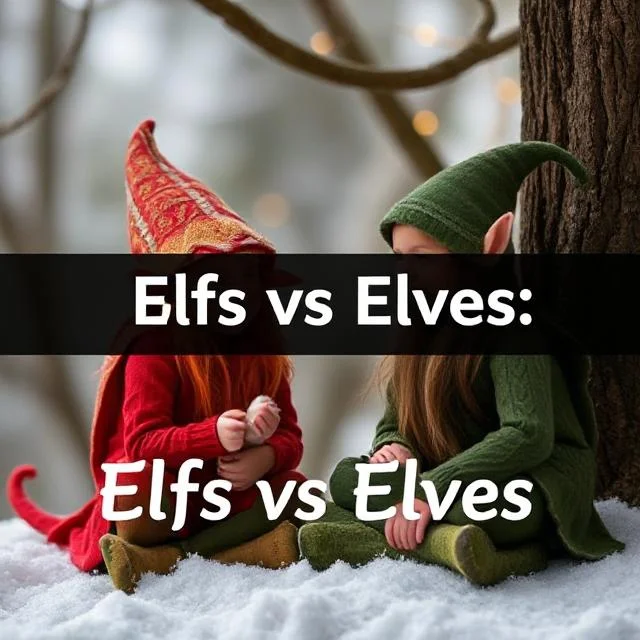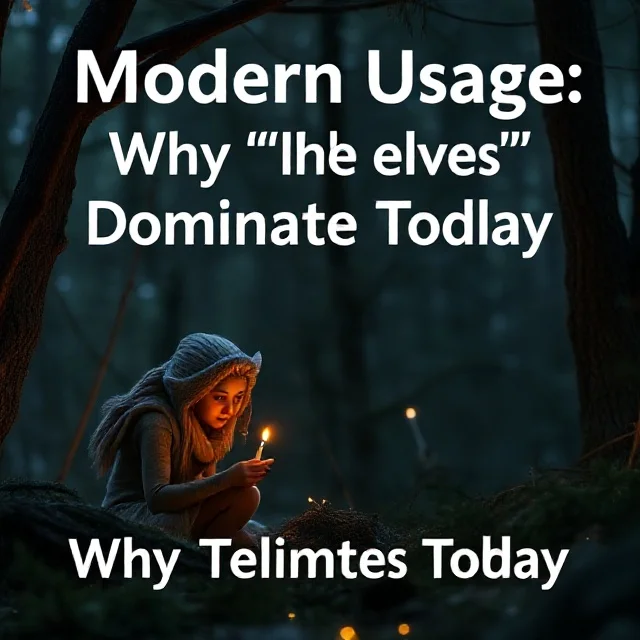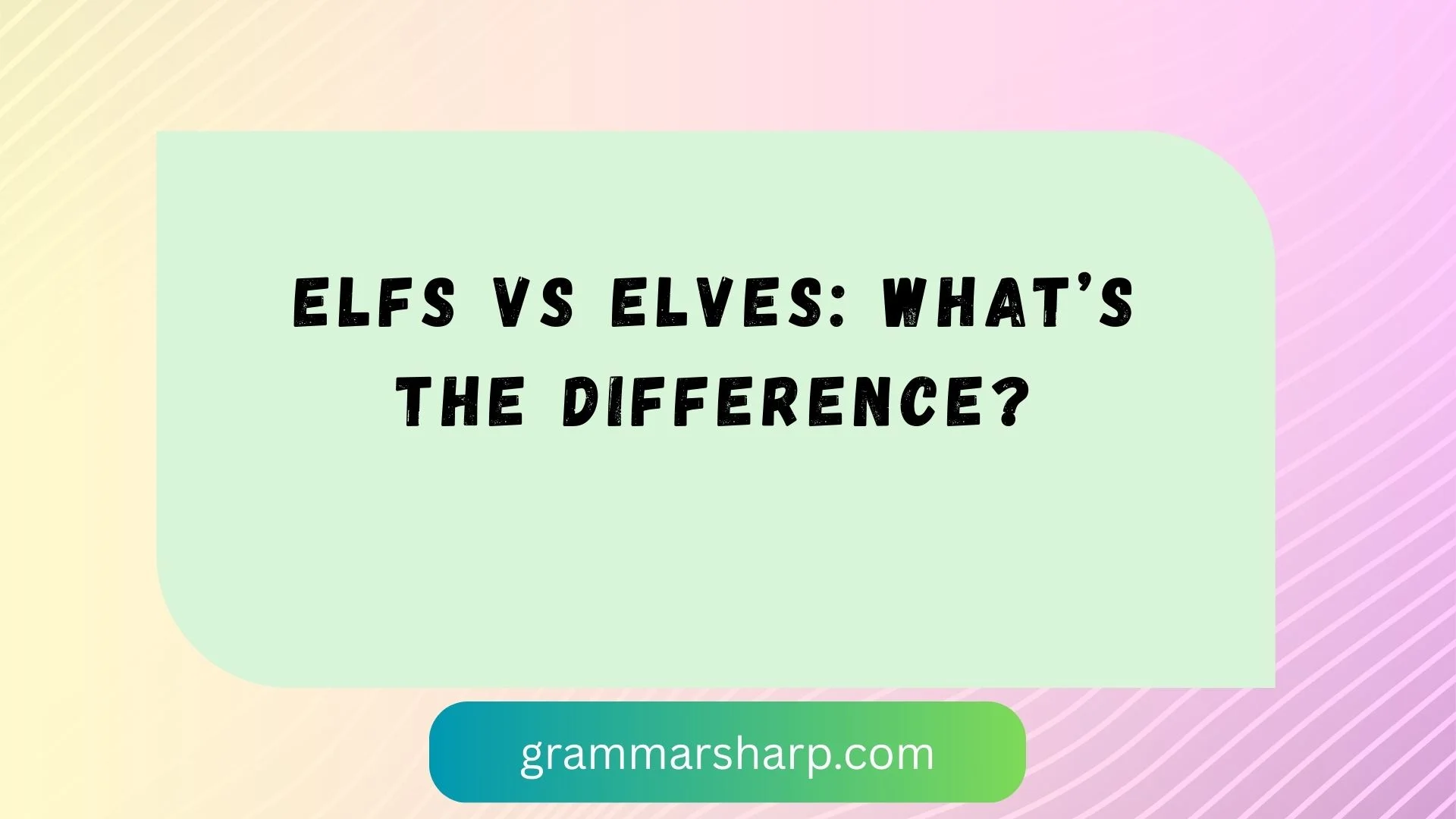Language often surprises us with little quirks that spark confusion. One of the most common head-scratchers appears when you’re writing about mythical beings—should you say elfs or elves? Maybe you’ve seen both in books or heard different versions in movies and wondered which one is right. The truth is, both forms exist, but they carry different histories, contexts, and levels of acceptance in modern English.
This isn’t just a grammar question; it’s also a cultural one. The words we choose shape how we imagine these magical creatures, whether they’re the wise, noble elves of Tolkien’s world or the cheerful helpers in Santa’s workshop. Digging deeper into the debate uncovers fascinating roots in mythology, grammar rules that have shifted over centuries, and the influence of literature on the way we speak today.
By the time you finish this guide, you’ll know exactly when to use elves, when you might still encounter elfs, and why the distinction matters. Along the way, we’ll explore their mythological origins, dive into grammar breakdowns, look at cultural depictions, and even see some surprising fun facts about these enchanting beings.
Let’s clear the confusion once and for all.
The Quick Answer: Elfs vs Elves
The standard modern plural of elf is elves. This follows the English grammar pattern where words ending in -f often change to -ves in the plural.
- Elves = correct and widely accepted in modern English.
- Elfs = an older, less common form. You’ll see it in historical texts or when authors use it for stylistic effect.
In short: if you’re writing today, use elves.
What Is an Elf?
Before splitting hairs over spelling, let’s step back and define what an elf actually is.
An elf is a mythological creature with roots in Germanic, Norse, and Celtic folklore. They’ve been described as supernatural beings with magical powers, often connected to nature. In some traditions, they were beautiful and immortal; in others, they were mischievous troublemakers blamed for illness or bad luck.
Over time, the image of elves evolved:
- Norse mythology: Elves (álfar) lived in Alfheim, a realm of light.
- Medieval Europe: They were often portrayed as tricksters or spirits.
- Modern fantasy: From Tolkien’s majestic high elves to Santa’s jolly helpers, elves now range from noble warriors to toy-making assistants.
Examples in pop culture:
- The Lord of the Rings – Legolas and the elven kingdoms.
- Dungeons & Dragons – Elves as a playable race, often linked to magic.
- Christmas traditions – Santa’s elves making toys at the North Pole.
So, when we talk about “elfs vs elves,” it’s not just a spelling choice. It’s also about how our imagination frames these creatures.
Grammar Breakdown: Elfs vs Elves

Now for the grammar. Why is elves considered the correct plural?
English has a set of irregular plural forms where words ending in -f or -fe change to -ves in the plural.
Examples of this pattern:
- Wolf → Wolves
- Shelf → Shelves
- Knife → Knives
- Life → Lives
“Elf” follows this same rule, so its plural naturally becomes elves.
So where does elfs come from?
In earlier English, people often just added “-s” to form the plural of “elf.” That’s why “elfs” existed. Over time, however, grammar rules shifted, and the “-ves” form became dominant. By the 19th and 20th centuries, dictionaries and style guides firmly established elves as the standard.
Key point: Elves is the accepted plural today. Elfs isn’t “wrong,” but it’s considered outdated or stylistic.
Historical Usage of “Elfs”
If you flip through older works of literature, you’ll notice that “elfs” appears more often.
- Edmund Spenser, in The Faerie Queene (1590), used “elfs.”
- Early English translations of Norse myths sometimes used “elfs.”
- In the 18th and early 19th centuries, both spellings were seen, though “elves” gradually overtook “elfs.”
This shift mirrors how English has standardized many irregular plurals. In fact, “elfs” held on longer than some other irregular cases because fantasy authors occasionally preferred the simpler form.
By the time Tolkien came along, though, “elves” was firmly cemented. His choice to consistently use “elves” helped push it further into mainstream acceptance.
Modern Usage: Why “Elves” Dominates Today

Today, dictionaries, grammar authorities, and popular culture overwhelmingly recognize elves as the correct plural.
Why?
- Standardization: English spelling and grammar were formalized in the 18th–19th centuries, locking in “elves.”
- Tolkien’s influence: His works became the gold standard for modern fantasy, shaping how we picture and spell “elves.”
- Cultural reinforcement: Movies, video games, and literature consistently use “elves,” reinforcing the spelling with each generation.
It’s rare to see “elfs” in modern writing unless it’s intentional for historical or stylistic reasons.
Style and Context: When Might You Use “Elfs”?
Even though “elves” is correct today, there are times when elfs might appear:
- Historical works: Older literature retains the spelling.
- Stylistic choice: Some authors or poets might choose “elfs” to evoke an archaic feel.
- Informal or playful writing: Children’s books, crafts, or games might use “elfs” because it looks simpler.
Think of “elfs” as a stylistic relic—something you might encounter but rarely need to use yourself.
Examples in Sentences
Here’s how both forms look in practice.
- Elves (correct, modern)
- The elves guarded the enchanted forest.
- Santa’s elves worked late into the night.
- Elfs (historical/stylistic)
- The ancient elfs were feared by farmers.
- In the old ballads, elfs danced by the riverbank.
Elves in Culture and Literature
The plural form isn’t just about grammar. It’s also tied to the way cultures depict elves.
- Norse mythology: Elves were radiant, almost godlike beings.
- German folklore: They were mischief-makers blamed for bad dreams or illnesses.
- Shakespeare: In A Midsummer Night’s Dream, elves appear as playful forest spirits.
- Tolkien: Redefined elves as noble, wise, and central to epic storytelling.
- Christmas traditions: The North Pole helpers cemented the child-friendly, cheerful version of elves.
The spelling “elves” became part of this cultural shift—modern readers associate it with both Tolkien’s grandeur and the holiday cheer of Santa’s helpers.
Common Mistakes and Misconceptions
When dealing with “elfs vs elves,” people often make a few mistakes:
- Believing “elfs” is always wrong: It’s not. It’s just outdated.
- Assuming elves are always small, jolly creatures: That’s only true in Christmas traditions.
- Mixing up elves with other beings: Fairies, dwarves, and goblins are different creatures.
Remember: words evolve, and “elfs” is simply a stepping stone in that evolution.
Fun Facts About Elves
- In Old Norse, the word for elf was álfr.
- Elves were once blamed for “elf-shot”—mysterious aches or illnesses thought to be caused by invisible arrows.
- Shakespeare’s A Midsummer Night’s Dream popularized the image of mischievous fairylike elves.
- The word “elf” shows up in names like Alfred, which originally meant “elf counsel.”
- In Iceland today, many people still believe in elves, known as huldufólk (hidden people).
Quick Reference Table: Elfs vs Elves
| Word | Correctness | Usage | Example |
| Elves | ✅ Correct, modern plural | Everyday writing, fantasy, grammar-standard works | “The elves live in Rivendell.” |
| Elfs | ⚠️ Outdated/rare | Historical, stylistic, certain authors | “The elfs danced in the moonlight.” |
FAQs
Is “elfs” grammatically correct?
Yes, but it’s outdated. The preferred modern form is elves.
Why does “elf” become “elves”?
Because English often changes -f to -ves in plurals (like wolf → wolves).
Do dictionaries accept “elfs”?
Most list it as an archaic or rare form. “Elves” is the standard.
Did Tolkien use “elves” or “elfs”?
Tolkien consistently used elves, which helped cement it in modern English.
Is “elfs” ever used in modern writing?
Rarely. You might find it in poetry, children’s stories, or as a stylistic choice.
Conclusion
So, what’s the difference between elfs vs elves? The answer lies in history and language evolution. Elves is the modern, correct plural, shaped by grammar rules and popularized through literature and culture. Elfs lingers as a relic of older English, still appearing occasionally but largely out of everyday use.
Next time you write about Santa’s helpers or Tolkien’s warriors, you’ll know which form to choose. Language evolves just like stories do, and the journey from elfs to elves is a perfect reminder of how culture, grammar, and imagination intertwine.

